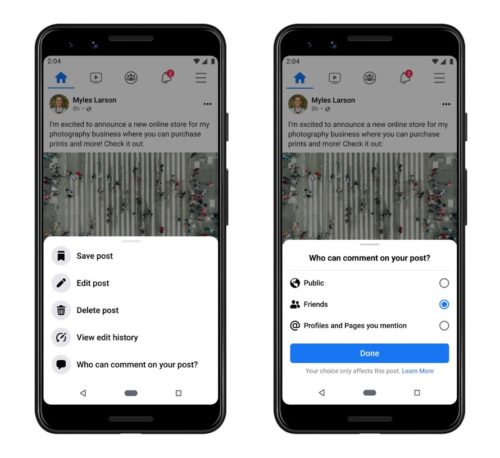Facebook’s new feature to limit or turn off comments: what you need to know
Community managers have a new tool at their disposal with the ability to turn off Facebook comments rolling out this month. Similar to the comment-limiting feature on Twitter, the new option gives users the chance to choose who can comment on posts, out of ‘Public’, ‘Friends’ or ‘Profiles and Pages you mention.’ Comments will be able to turned off when posting, or retrospectively, once a post is already live.
Here’s what it will look like.

The feature is long-awaited by Australian news media companies, who have been declared liable for defamatory comments posted by users on their public Facebook pages following the high-profile case of Dylan Voller, a former Northern Territory youth detainee. Voller sued media outlets including The Sydney Morning Herald, The Australian, and Sky News Australia, over comments about him made on their Facebook pages by third party users. After his case was successfully prosecuted, the ruling was later upheld by the NSW Court of Appeal.
Although the courts found that media companies had a responsibility to pre-moderate comments, this was not possible on most social media platforms until recently, creating headaches for publishers using Facebook to amplify news content. The ability to turn off comments was one feature media companies asked for from Facebook during negotiations regarding Australian government’s news media bargaining code legislation, which passed the parliament last month.
So what does this mean for brands, publishers and individuals? We’ve put together a few pointers.
Comments are still valuable
Comments are an important engagement feature. They provide a space for your audience to give feedback, and an opportunity for you to engage thoughtfully with your followers. Comments also contribute to your post’s algorithmic weighting. Turning off comments on every post is likely to significantly impact reach, not to mention disappoint your audience.
Consider assigning a risk rating to your posts
Posts most likely to generate defamatory comments are usually posts about controversial individuals and people involved in current or recent court cases. Also, we have observed that Indigenous Australians, people of colour and women often face more online hate than other groups. These are two factors that should be considered when assigning a risk rating to posts. Another risk factor might be posting when you know you will have limited moderation resources available. Posts which receive a ‘high risk’ rating may be posts you consider limiting comments on. Brand posts are usually less likely to be as risky than posts from news publishers, unless your posts highlight specific individuals or relate to controversial topics like industrial action.
Yes, you will still need to moderate
As welcome as Facebook’s new feature is, it won’t save all your moderation woes. Sometimes posts you think are completely innocuous end up spinning out of control and need an experienced moderator to set them right. Also, while it’s believed that the ‘limit comments’ feature will be retrospective, it’s unlikely that you’ll be able to remember every high-risk post your Page has made in the past. Keeping an eye on comment notifications in your Inbox and reviewing all comments as they come in is still best practice.
In event that you do have more time on your hands due to strategic comment limiting, use this time to engage in community management activitie, like responding to comments or interacting with other Pages as your brand. Remember – social media is supposed to be social, otherwise it’s just old-school broadcast media.
Facebook’s new comment tool was announced on March 31st and is expected to roll out across all users over the coming weeks.
Need help with social media moderation? Quiip offers 24/7 community management services alongside governance support and training so you can maximise engagement while minimising risk.
